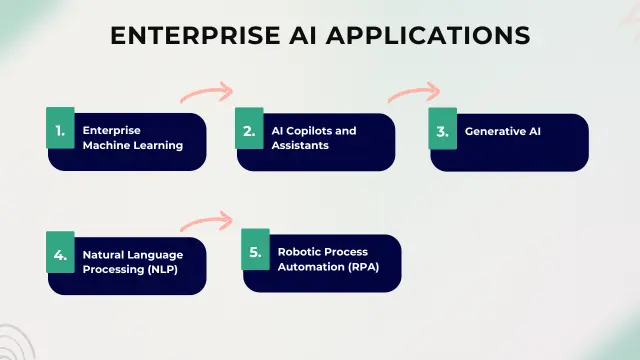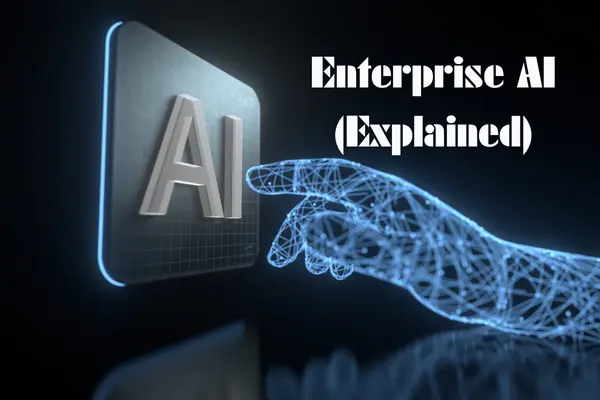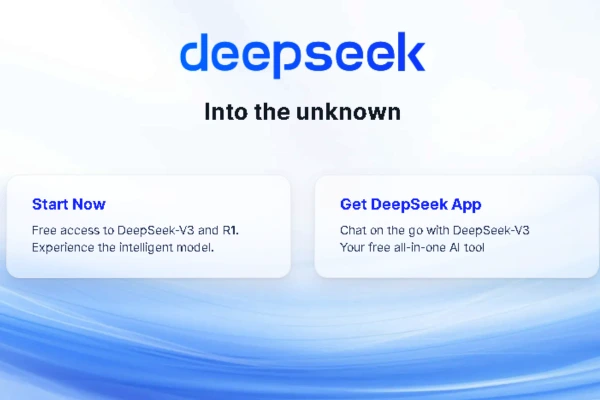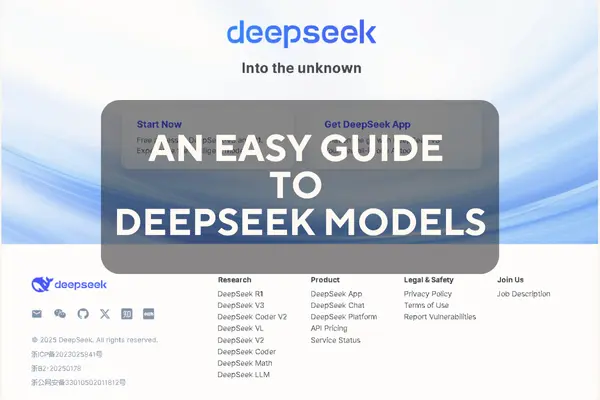Enterprise AI is a powerful software category that enables large organisations to leverage artificial intelligence (AI) at scale across their entire business. It combines technologies like cloud computing, big data, and IoT to solve high-value problems, such as:
- Predicting equipment failures (e.g., in oil rigs or aircraft).
- Optimizing supply chains (e.g., reducing inventory costs).
- Analyzing customer data for better decisions (e.g., in banking).
Unlike small AI experiments, Enterprise AI is scalable, repeatable, and focused on delivering real business value.
What is AI vs. Enterprise AI?
First, let’s understand Artificial Intelligence (AI).
- AI is like teaching a computer to have “human-like” brainpower. It means a machine can do smart things like understanding language, recognizing pictures, solving problems, and learning from experience. Think of it as the general idea of making computers smart.
Now, let’s talk about Enterprise AI.
- Enterprise AI is when large organizations (like big businesses, governments, or major hospitals) use these advanced AI technologies.
- It’s not just about trying out a small AI project; it’s about making AI work across all parts of their operations, at a massive scale.
- The goal is to use AI to completely change how the company works, making it more efficient, innovative, and successful.
- The main difference is that Enterprise AI handles the big challenges of making AI useful and safe for an entire large organization, including managing huge amounts of data, ensuring security, and making sure the AI helps achieve big business goals.
What is an Enterprise AI Platform?
Think of an Enterprise AI platform as a special, all-in-one toolkit that a big company uses to build and run its AI projects.
- It’s a set of pre-built and connected technologies that make it much easier and faster to create, use, and manage many different AI applications.
- Before these platforms, companies had to build every AI application from scratch using lots of separate, tiny pieces of software (like Lego bricks that don’t quite fit together). This made AI projects very complicated and hard to keep working.
- An Enterprise AI platform brings everything together, providing:
- The necessary tools for handling huge amounts of data.
- Ways to apply advanced AI and machine learning methods.
- The ability to work across different “clouds” (like different giant internet computer centers).
- Ways for different teams, like data scientists and software developers, to work together smoothly.
- It ensures that AI systems are stable, reliable, and can be used over and over again for different tasks.
- Examples of such platforms include the C3 AI Suite™.

What is Enterprise AI Used For? (And its Benefits)
Enterprise AI is used to solve big, tricky problems that were once impossible for companies to tackle, and to help them find new ways to earn money or become much more efficient.
Here are some of the main things Enterprise AI helps with:
- Driving Innovation: It makes AI tools more accessible to many different teams within a company, not just expert data scientists. This means more people can come up with new ideas and use AI to improve their work.
- Enhancing Governance: It helps companies manage and control how AI is used, especially with sensitive information. This builds trust and ensures AI decisions are fair and understandable.
- Reducing Costs: By automating tasks and managing computing resources better, Enterprise AI can help companies save a lot of money.
- Increasing Productivity: AI can take over repetitive tasks, freeing up human workers to focus on more creative and important work. It also speeds up business operations, like getting products from design to delivery faster.
- Better Decision-Making: AI analyzes vast amounts of data to give leaders and teams clear insights, helping them make smarter, faster decisions.
- Improving Customer Experience: AI can personalize marketing messages, recommend products, and provide 24/7 customer support through chatbots, making customers happier.
Enterprise AI Examples (Real-World Use Cases)
Enterprise AI is used across many different industries for various purposes:

- Predicting Equipment Failures:
- A large oil and gas company utilises AI to predict when parts, such as valves, might fail, thereby saving millions of dollars by addressing them before they cause a significant issue.
- The US Department of Defense uses AI to predict when parts on thousands of aircraft (like F-16s) might fail, leading to less unplanned maintenance and more planes ready for missions.
- A medical technology leader prevents over 500 hours of unplanned machine downtime in one facility using AI.
- Optimizing Supply Chains: A large manufacturer uses AI to manage its global supply chain across over 200 locations, improving how much safety stock they need and freeing up machine time. AI can also forecast product demand and identify problems in the supply chain.
- Customer Service:
- A global telecom company (T-Mobile) uses AI to make customer interactions faster and better, helping human agents serve customers more effectively.
- AI-powered chatbots provide instant answers to customer questions at any time, day or night.
- Financial Security: In finance, AI algorithms detect unusual patterns in transactions to stop fraud, which is super important for banking and online payments.
- Drug Discovery: A global pharmaceutical company (AstraZeneca) uses an AI platform to find new drugs faster and with better quality.
- Personalized Experiences: AI analyzes customer information to create special marketing campaigns and product suggestions just for them.
- Human Resources: AI can help HR teams screen resumes and match candidates to jobs, and even advise on training and how to keep employees happy.
- Cybersecurity: AI helps find and stop cyber threats by looking for strange activity on computer networks before it can cause big damage.
- Healthcare Diagnostics: AI helps in healthcare by diagnosing diseases, analyzing medical images, and predicting how patients will recover, making diagnoses faster and more accurate.
Enterprise AI Tools and Services
Companies use different types of tools and services to build and deploy Enterprise AI:
- Open Source Components: These are like free, individual software pieces (e.g., Hadoop, TensorFlow, Spark) that are useful for specific tasks. However, a company would have to put dozens of these together to make a full AI system, which is very hard to do well at a large scale.
- Cloud Service Providers (CSPs): Big tech companies like AWS (Amazon Web Services) and Microsoft Azure offer many AI services.
- AWS offers services like Amazon Rekognition for analyzing images and videos, Amazon Lex for building chatbots, and Amazon SageMaker for building, training, and deploying machine learning models.
- Amazon Bedrock is specifically for creating generative AI applications.
- Microsoft Azure AI provides services for machine learning, bots, and cognitive services.
- Enterprise AI Platforms: These are what this guide focuses on – integrated suites of tools designed specifically for large-scale AI deployment. They offer core capabilities like:
- Data Aggregation: Bringing together and organizing huge amounts of data from many different places.
- Multi-Cloud Computing: Making sure AI applications can run smoothly whether a company uses its own private computer servers or big public cloud services.
- Edge Computing: Allowing AI to process data directly on devices (like sensors or smart meters) far away from central computers, for faster results.
- Enterprise Semantic Model: A consistent way for the AI to understand and connect all the different pieces of information within the company.
- Enterprise Microservices: Small, reusable AI “building blocks” that developers can easily use to create new applications.
- Data Governance and Security: Making sure all the data used by AI is safe, private, and used ethically.
- Open Platform: Allowing the AI system to connect and work with other software and tools the company might already use.
- Collaborative Development Tools: Helping data scientists and software developers work together efficiently to build and refine AI models.
Enterprise AI Applications
When we talk about “applications” in Enterprise AI, we mean the finished software programs that actually use AI to do things for the business. These applications are built using the platforms, tools, and services mentioned above.

Some common types of Enterprise AI applications include:
- Enterprise Machine Learning: These applications analyze vast amounts of data to find patterns, make predictions, and learn from outcomes. Examples include predicting when machines need maintenance or figuring out what products a customer might like.
- AI Copilots and Assistants: These are like smart helpers for employees. They can automate tasks, help find documents, or even assist in writing code.
- Generative AI: These applications can create new content, like marketing materials, product designs, or even generate realistic data for training other AI models. They use human-like logic and language. This is also being used to improve existing business systems like ERP (Enterprise Resource Planning) and CRM (Customer Relationship Management) by allowing natural language interactions and automating manual tasks.
- Natural Language Processing (NLP): These applications help computers understand, interpret, and generate human language. They power chatbots and virtual assistants that handle customer support.
- Robotic Process Automation (RPA): These applications automate repetitive, rule-based tasks that humans used to do, integrating across different software systems to manage complex workflows.
In short, Enterprise AI is about putting cutting-edge artificial intelligence to work for big companies to solve huge challenges, save money, boost productivity, and drive innovation across their entire business.
Sources:
1. https://www.sap.com/resources/what-is-enterprise-ai
2. https://www.ibm.com/think/topics/enterprise-ai
3. https://aws.amazon.com/what-is/enterprise-ai/
4. https://c3.ai/glossary/artificial-intelligence/enterprise-ai/



